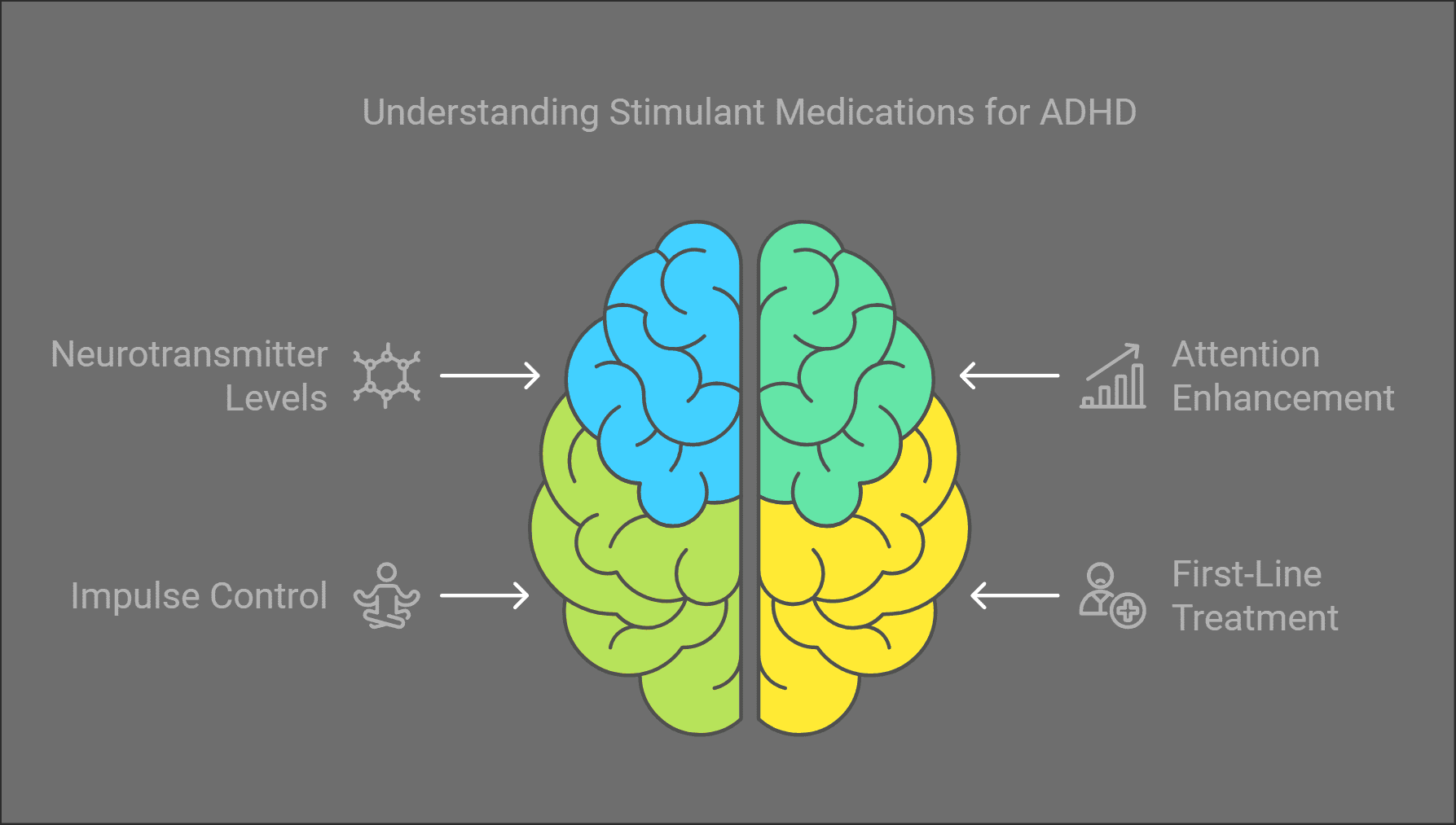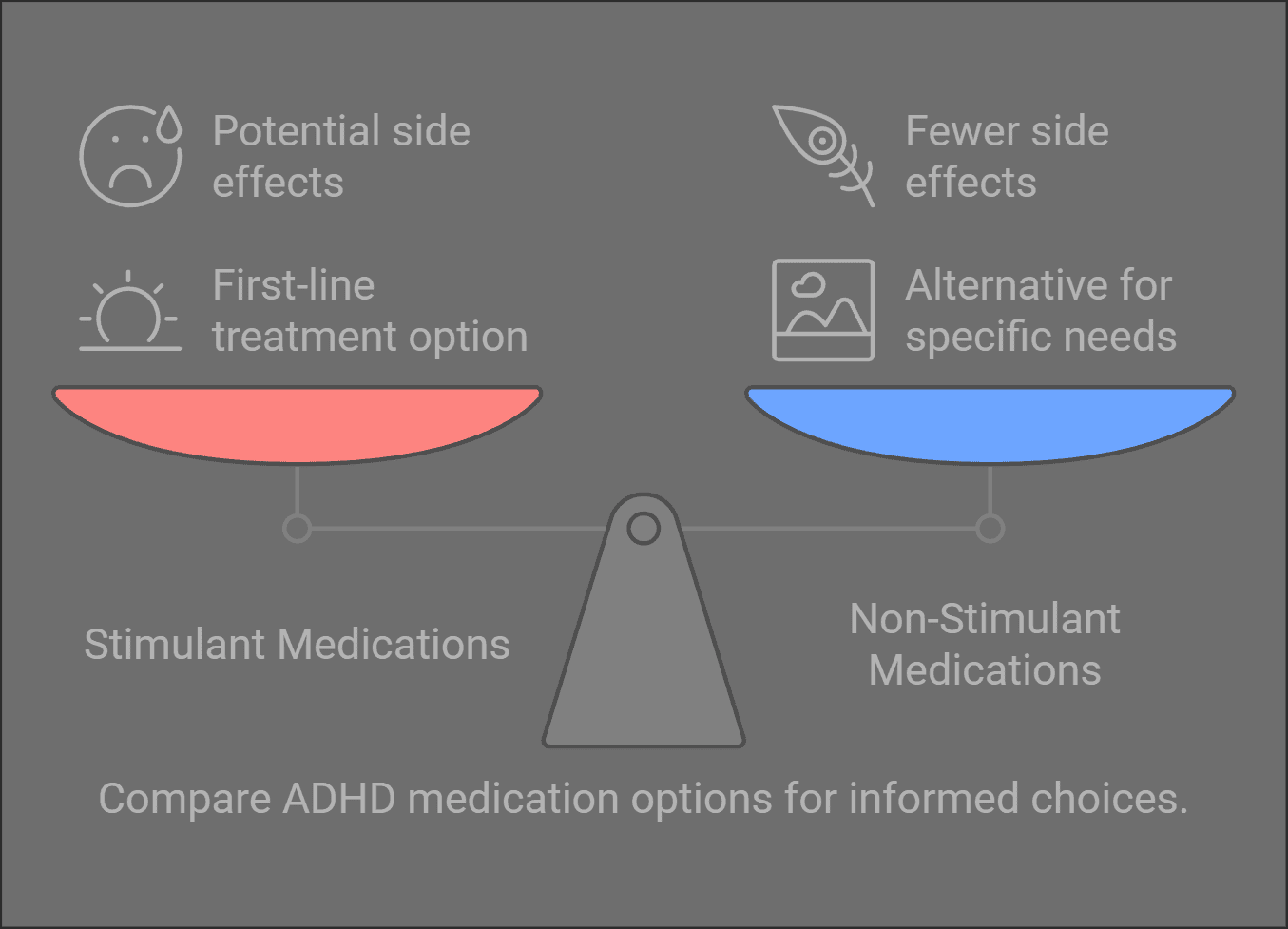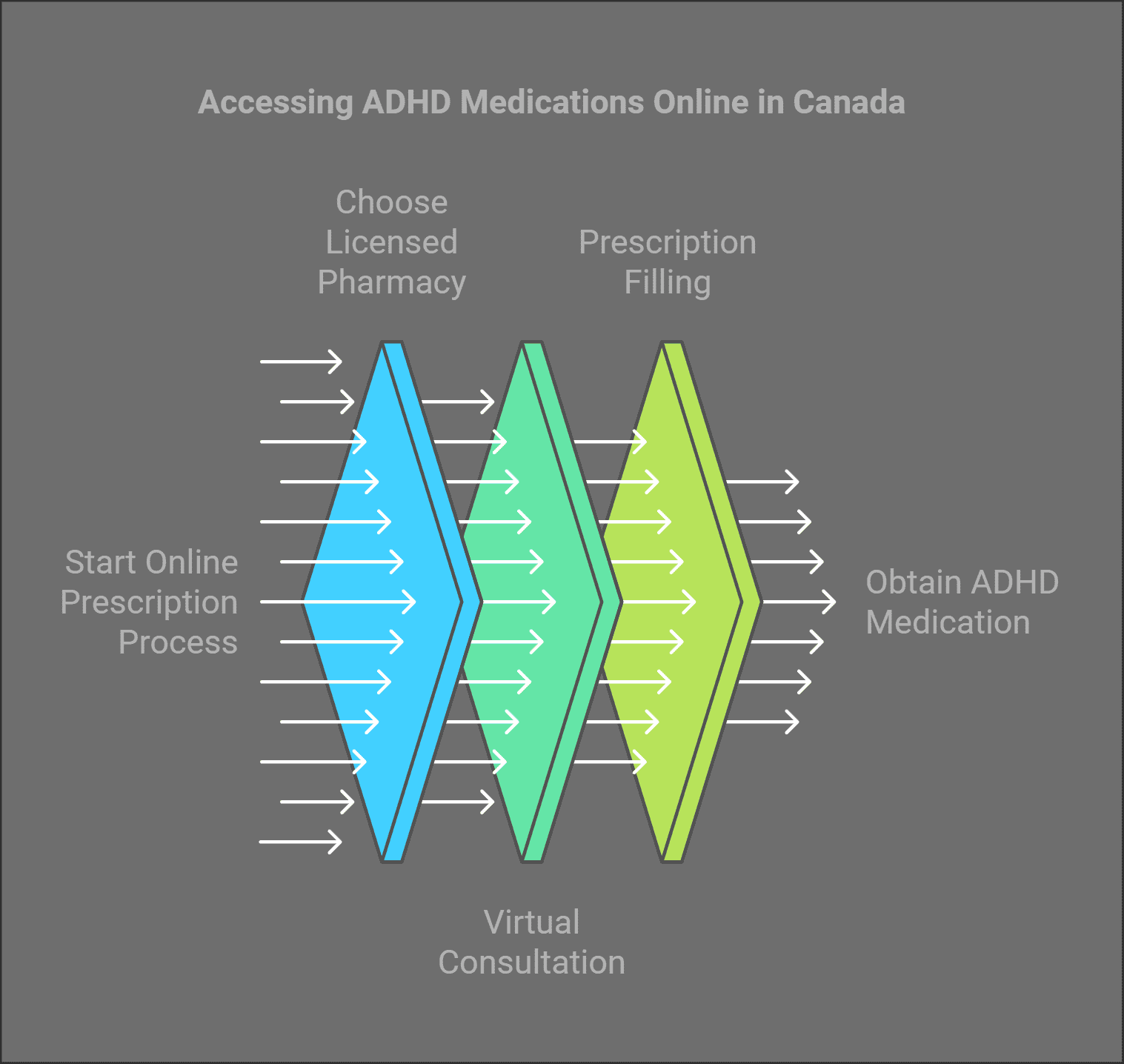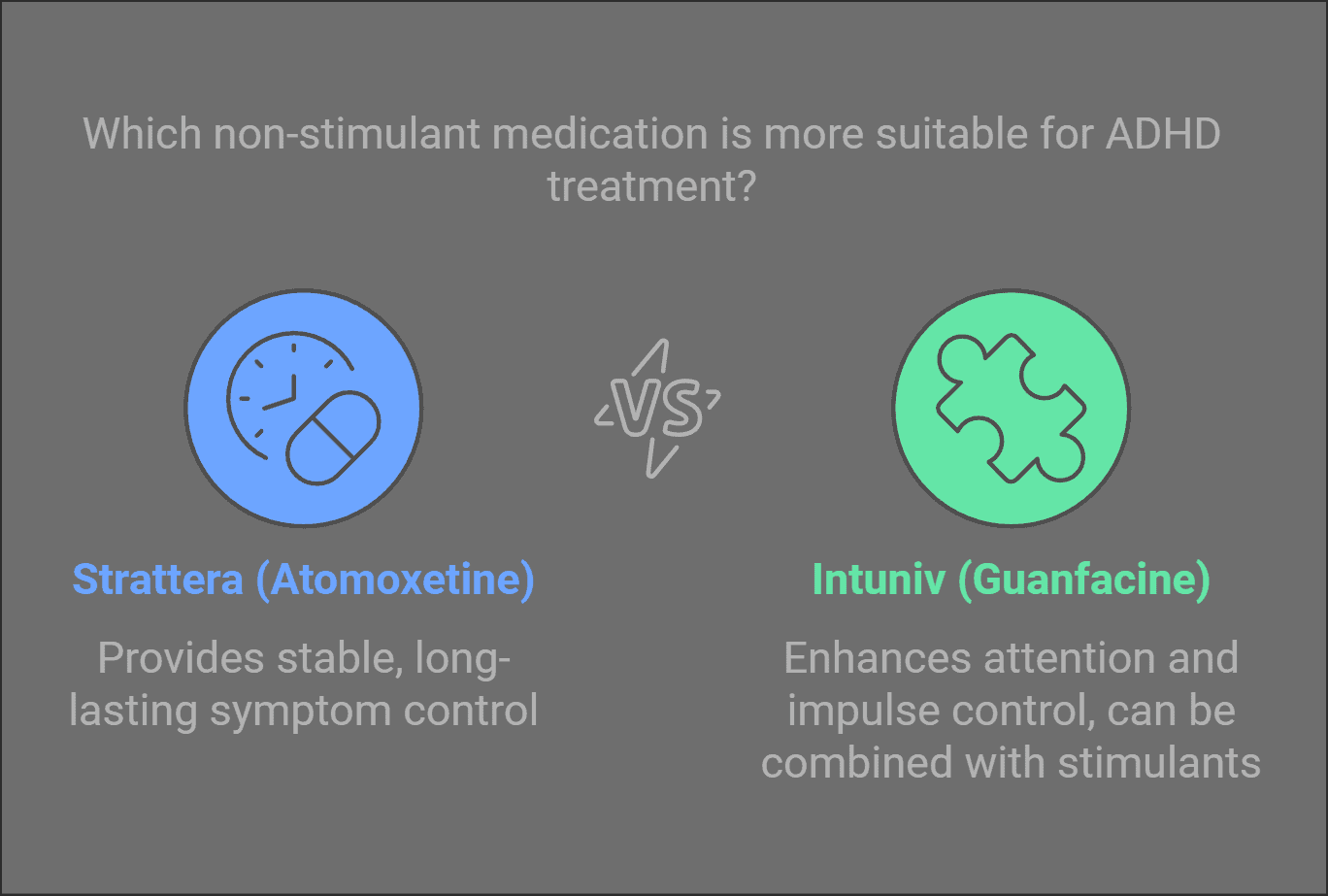ADHD Medications in Canada: A Comprehensive Comparison for 2025
ADHD (Attention-Deficit/Hyperactivity Disorder) affects millions of adults in Canada, significantly impacting daily life. Common challenges include:
- Difficulty focusing on tasks
- Impulsivity in decision-making
- Struggles with organization and time management
These symptoms can hinder personal and professional relationships, creating a pressing need for effective treatment options.
This article delivers a comprehensive comparison of ADHD medications available in Canada for adults.
Key aspects covered include:
- Different types of medications
- Effectiveness in managing symptoms
- Common side effects of ADHD medications associated with each option
- Accessibility through online prescriptions
Understanding these factors is crucial for individuals seeking the most suitable ADHD meds for adults. This overview aims to empower readers with knowledge about their treatment choices, ensuring informed decisions regarding their health.
Understanding ADHD and Its Treatment

Attention-Deficit/Hyperactivity Disorder (ADHD) is one of the most common neurodevelopmental disorders that affects adults. It presents a variety of symptoms that can significantly impact daily functioning.
Common Symptoms of ADHD in Adults
Common ADHD symptoms in adults include:
- Inattention: Difficulty sustaining focus, organizing tasks, and following through on instructions.
- Hyperactivity: Restlessness, excessive talking, and difficulty remaining seated in situations where it is expected.
- Impulsivity: Making hasty decisions without considering long-term consequences, interrupting others, or blurting out answers.
The Impact of ADHD on Daily Life
The impact of ADHD on daily functioning can lead to significant challenges in personal relationships and workplace performance, affecting overall quality of life.
The Importance of Early Recognition and Treatment
May Experts emphasize the importance of recognizing these symptoms early and seeking appropriate treatment options.
Treatment Options for ADHD
Treatment may include behavioral therapy and medication such as amphetamines, which are commonly prescribed to help manage symptoms effectively.
Understanding the multifaceted nature of ADHD is crucial for those affected and for their support systems.
The Role of Medication in ADHD Treatment
Medication plays a crucial role in ADHD treatment by effectively managing ADHD symptoms. It helps improve concentration and impulse control, reduces impulsivity, and enhances emotional regulation in individuals with ADHD. By addressing these core difficulties, ADHD medication can lead to significant improvements in daily functioning for adults with ADHD.
Other Treatment Options for ADHD
In addition to medication such as psychostimulants, behavioral therapies for ADHD and lifestyle modifications for ADHD management may also be beneficial. A comprehensive treatment plan for ADHD tailored to individual needs can optimize symptom management and improve daily functioning. Following established ADHD treatment guidelines, this individualized ADHD treatment approach ensures that various factors, including the impact on the cardiovascular system, are considered. Additionally, incorporating a careful titration schedule for medications can enhance effectiveness while minimizing side effects.
Importance of Ongoing Assessment
Regular consultations with healthcare providers ensure ongoing assessment of ADHD treatment and necessary adjustments to therapy as individual needs change. These consultations are crucial for monitoring progress and determining appropriate treatment adjustments based on symptoms and overall well-being.
Categories of ADHD Medications
When exploring ADHD treatment options in Canada, it’s essential to understand the different categories of ADHD medications available. These medications are primarily divided into two main groups: stimulant vs non-stimulant medications. Stimulant medications are often the first line of treatment due to their effectiveness in managing symptoms. Non-stimulant medications may be considered as alternatives for those who experience adverse effects or have specific needs.
In Canada, ADHD medication comes in various forms and dosages, allowing healthcare professionals to tailor treatments according to individual requirements. Understanding these categories can help patients make informed decisions about their ADHD treatment options.
Stimulant Medications for ADHD
Stimulant medications are the most frequently prescribed treatments for ADHD. They work by enhancing the activity of certain neurotransmitters in the brain, primarily dopamine and norepinephrine. This increased activity helps improve concentration, focus, and impulse control. Two primary categories of stimulant medications include:
- Methylphenidate-based medications
- Amphetamine-based medications
How Stimulants Work in the Brain
Stimulants operate by blocking the reuptake of dopamine and norepinephrine in the brain. This leads to an increase in their availability in synaptic spaces, which can significantly enhance attention span and reduce impulsivity. Understanding how stimulants work in the brain is essential, as their effectiveness in managing ADHD symptoms is well-documented, making them a first-line treatment option.
Commonly Prescribed Stimulant Medications
Several stimulant medications are commonly prescribed in Canada for adults with ADHD:
- Ritalin (Methylphenidate): Often used for its rapid onset and relatively short duration of action. Typically taken multiple times throughout the day.
- Concerta (Methylphenidate): A long-acting formulation that provides extended symptom control, allowing for once-daily dosing. Ideal for those needing consistent management throughout their day.
- Adderall (Amphetamine): Combines different amphetamine salts to provide a smooth release of medication throughout the day. Known for its efficacy in reducing hyperactivity and improving focus.
- Dexedrine (Dextroamphetamine): Another amphetamine option that has a more potent effect on the central nervous system. Often prescribed for individuals who may not respond adequately to other stimulant options.
These stimulant medications have been shown to effectively reduce core symptoms of ADHD, leading to improved functioning in daily activities.
Potential Side Effects and Considerations
However, it’s important to note that these medications can sometimes cause common side effects of stimulant medications such as nausea or vomiting. In such cases, parents may need guidance on how to safely redose medications after vomiting episodes. For comprehensive insights on this topic, refer to this helpful guide on redosing after vomiting.
Non-Stimulant Medications for ADHD
Non-stimulant medications offer an alternative treatment option for individuals with ADHD who may not respond well to stimulants or prefer not to use them. These medications work through different mechanisms compared to stimulants and can be beneficial in managing symptoms.
Commonly Prescribed Non-Stimulant Medications

In Canada, there are two main non-stimulant medications approved for the treatment of ADHD:
- Strattera (Atomoxetine): Strattera (Atomoxetine) is a selective norepinephrine reuptake inhibitor (NRI) that increases the levels of norepinephrine in the brain. It is typically taken once daily and may take several weeks to reach its full effect. This long-acting medication is particularly useful for individuals seeking stable symptom control throughout the day.
- Intuniv (Guanfacine): Intuniv (Guanfacine) is an alpha-2 adrenergic agonist that affects certain receptors in the brain involved in regulating attention and impulse control. It is usually taken once daily and can be used alone or in combination with stimulant medications. As one of the key non-stimulant medications for ADHD, Intuniv can help manage symptoms effectively, especially in those who experience side effects from stimulants.
These non-stimulant options can be particularly useful for individuals who experience side effects from stimulants or have specific contraindications to their use. Understanding the different mechanisms of non-stimulant medications can help individuals make informed decisions about alternative ADHD treatment options.
Importance of Understanding Medication Categories for ADHD
Understanding medication categories is crucial for individuals seeking effective treatment options for ADHD. Different medications may suit various individual needs in ADHD medication selection based on factors like response to treatment and side effect tolerance.
Exploring both stimulant and non-stimulant treatment options can provide a holistic approach to managing ADHD symptoms effectively. Additionally, it’s essential to consider understanding titration schedules for ADHD drugs to ensure optimal dosing and efficacy.
For those in Canada, being aware of these categories can significantly impact the success of your treatment plan.
Non-Stimulant Medications
ADHD medication categories primarily include stimulants for ADHD and non-stimulants. Non-stimulant medications are essential alternatives for managing ADHD symptoms, particularly when stimulants are ineffective or cause unacceptable side effects. Exploring the risks and benefits of ADHD medications is crucial in determining the best treatment approach.
Definition and Types of Non-Stimulant Medications:
Non-stimulant medications work differently from stimulant medications, which include Methylphenidate and amphetamines. They do not increase dopamine levels in the brain in the same way. Common types of non-stimulant medications include:
- Atomoxetine (Strattera): A selective norepinephrine reuptake inhibitor (NRI), effective in improving attention and reducing impulsivity.
- Guanfacine (Intuniv): An alpha-2 adrenergic agonist, often used to manage hyperactivity and impulsivity.
- Clonidine (Kapvay): Another alpha-2 adrenergic agonist, suitable for addressing symptoms especially at night—particularly effective for night-time symptoms.
When Non-Stimulants Are Preferred Over Stimulants:
- Patients who experience significant side effects from stimulant medications may benefit from non-stimulants.
- Individuals with a history of substance abuse may prefer non-stimulant options due to their lower potential for misuse.
- Non-stimulants may also be more appropriate for patients with co-existing conditions such as anxiety disorders.
In Canada, these non-stimulant options provide valuable alternatives within the broader scope of ADHD treatment strategies. Understanding the definition and types of non-stimulant medications is vital for making informed decisions about managing ADHD effectively.
Effectiveness and Side Effects of ADHD Medications
When evaluating the effectiveness of ADHD medications it’s important to understand the difference between stimulant and non-stimulant options. This knowledge is essential for making informed treatment decisions, as it reveals the differences in stimulant vs non-stimulant effectiveness comparison.
Comparative Effectiveness of ADHD Medications
1. Stimulants
This category is widely recognized for delivering significant symptom reduction in individuals with ADHD. Studies indicate that up to 80% of patients experience meaningful improvements in focus, impulsivity, and hyperactivity. The comparative effectiveness of ADHD medications shows that stimulants are often the first line of treatment due to their proven efficacy.
2. Non-Stimulants
While they may be beneficial for some, non-stimulant medications often provide more modest results. Their effectiveness can vary greatly based on individual health factors and specific symptom profiles. When considering symptom reduction in stimulants vs non-stimulants, it’s important to note that non-stimulants may be more suitable for individuals with certain coexisting conditions or those seeking ADHD medication in Canada.
Common Side Effects
Stimulant Medications:
- Increased heart rate
- Insomnia
- Decreased appetite
- Anxiety or irritability
These are some of the common side effects of stimulant medications that individuals may experience.
Non-Stimulant Medications:
- Fatigue or sedation
- Dizziness
- Gastrointestinal issues (nausea, diarrhea)
- Lowered blood pressure
These symptoms represent the common side effects of non-stimulant medications.
The side effects associated with each category can often be managed through dosage adjustments for side effect management or medication changes. Understanding these factors is crucial for tailoring a treatment plan that optimally addresses individual needs while minimizing adverse effects. Effectively managing side effects of ADHD medications is essential for ensuring that patients can benefit from their therapeutic effects while reducing discomfort. Additionally, considering different dosage forms may also play a significant role in how well side effects are tolerated.
Personalized Medication Plans for Adults with ADHD
Finding the right ADHD medication often requires personalized treatment plans designed specifically for each person’s needs and preferences.
Given the ADHD symptoms variability that exists among individuals, it’s essential to consider several important factors:
- Variability in Symptoms: Every adult experiences ADHD differently, so it’s crucial to customize treatment approaches that address their unique experiences.
- Response to Medications: People may have different reactions to stimulant and non-stimulant medications, highlighting the importance of a tailored strategy.
Healthcare providers play a vital role in this process. Their responsibilities include:
- Monitoring Progress: Regular check-ups are essential for assessing how well the medication is working and identifying any side effects.
- Adjusting Treatment Plans: Providers can modify dosages or switch medications based on patient feedback and observed outcomes.
Building a collaborative relationship with healthcare professionals increases the chances of achieving the best results. Ongoing communication in ADHD treatment ensures that any new issues are addressed quickly, making it easier to implement changes that fit the patient’s evolving needs.
Personalized treatment not only aims to improve symptom management but also supports overall well-being in ADHD patients, empowering adults with ADHD to thrive in their daily lives.
Accessibility and Online Medication Options in Canada
Canadians can now access ADHD medications through online ADHD medication prescriptions from licensed pharmacies in Canada like MisterPharmacist. This option has gained traction due to its convenience and efficiency. Key points about the accessibility of ADHD medications in Canada include:
- Licensed Pharmacies: Only use online pharmacies that are registered and licensed within Canada, such as MisterPharmacist. This ensures the safety and legitimacy of the medications being prescribed.
- Virtual Consultations for ADHD: Many online platforms, offer virtual consultations with healthcare professionals. These consultations allow for thorough evaluations and personalized treatment plans online, ensuring that each patient receives tailored care without the need to visit a physical clinic.
- Filling your ADHD medication prescriptions. It is important to point out that virtual consultations do not obligate patients to fill their prescribed medication from the pharmacy recommended by the health consultant. You may choose to steer them to your OWN pharmacy for faster access to the medications prescribed. This pharmacy choice can include MisterPharmacist online pharmacy – which provided quick access to Torontonians to their newly acquired prescriptions. All you need to tell your virtual consultant is the name and fax number for your chosen pharmacy and you may then follow up with the pharmacy directly.
By utilizing these resources, individuals can effectively navigate finding ADHD treatment resources in Canada while ensuring they receive appropriate medication and support.
Benefits of Online Prescriptions
- Convenience: Patients can obtain prescriptions from the comfort of their homes, reducing travel time and associated stress. This is especially beneficial for those seeking online medication access for ADHD, as it allows for easier management of their symptoms.
- Privacy: Online services provide a discreet way for individuals to manage their condition without facing potential stigma in traditional settings. This is crucial for maintaining privacy in ADHD management, offering discreet ADHD treatment options that respect personal confidentiality. The best approach is to have the clinic fax the prescription directly to the pharmacy of choice.
Considerations
- Quality Assurance: It is essential to verify that the online pharmacy adheres to Canadian regulations for online medications to avoid counterfeit medications. Ensuring quality assurance in online pharmacies is crucial for safe access to ADHD treatments.
- Follow-up Care: Regular check-ins with healthcare providers remain crucial for effective management of ADHD symptoms. This follow-up care for ADHD patients is vital, regardless of whether medications are obtained online or through traditional methods.
The rise of online ADHD medication options enhances accessibility in Canada while promoting a tailored approach to treatment. As patients weigh online vs. traditional ADHD medication access, understanding these considerations is key to successful management.

Conclusion
In Canada, adults with ADHD have a range of medication options to choose from, including both stimulant and non-stimulant medications. It’s important to understand the differences between these medications in order to make informed decisions about ADHD treatment that is tailored to each person’s needs. Whether you’re considering stimulant or non-stimulant medications, it’s crucial to have a good understanding of the various ADHD medication options available throughout the country.
Key Recommendations for ADHD Medication Plans
- Consult with healthcare providers to establish the most suitable medication plan tailored to your needs.
- Regular check-ins for treatment adjustments can help assess effectiveness and manage side effects.
Future Directions in ADHD Treatment
- Ongoing research in ADHD medications continues to evolve, paving the way for innovative approaches to care.
- Anticipate new medication options for ADHD symptom management that may enhance overall quality of life for individuals with this condition.
Engaging with healthcare professionals is essential to ensure access to the latest insights and treatment paradigms in managing ADHD effectively.
FAQs about ADHD Medications in Canada
In this section, we address common FAQs about ADHD medications in Canada. If you’re looking for information on ADHD medication options, dosages, and potential side effects, you’ve come to the right place.
What is ADHD and how does it affect adults?
Attention-Deficit/Hyperactivity Disorder (ADHD) is a neurodevelopmental disorder characterized by symptoms such as inattention, hyperactivity, and impulsivity. The impact of ADHD on adults can be significant, affecting daily life in various ways.
How ADHD affects adults
ADHD symptoms in daily life may manifest as:
- Difficulties in maintaining focus
- Challenges in managing time
- Struggles with organizing tasks
These challenges can strain personal relationships and hinder professional performance.
Importance of seeking support
For those seeking support, finding guidelines for ADHD treatment in adults is essential. There are several effective ADHD treatments in adults that can help manage symptoms and improve overall quality of life.
What types of ADHD medications are available for treating ADHD in Canada?
There are two main types of ADHD medications available in Canada: stimulant medications and non-stimulant medications. Both types play an important role in treatment options.
Stimulant Medications
Stimulants include commonly prescribed options like:
- Ritalin
- Concerta
- Adderall
- Dexedrine
These medications are often the first line of treatment due to their effectiveness in managing ADHD symptoms.
Non-Stimulant Medications
On the other hand, non-stimulants such as Atomoxetine, Guanfacine, Strattera, Intuniv, and Kapvay offer alternative solutions for those who may not respond well to stimulants or experience undesirable side effects.
When comparing different types of ADHD medications, it’s essential to consider individual needs and responses to treatment.
How do stimulant medications work for ADHD?
Stimulant medications are an important part of treating ADHD. They help people focus and pay attention better. These medications work by increasing the levels of certain chemicals in the brain called neurotransmitters. Neurotransmitters are important for controlling attention and managing impulses.
Stimulant medications are often the first choice for treating ADHD because they have been shown to be effective in reducing symptoms for many patients.
Stimulant options for ADHD medication in Canada
In Canada, there are several types of stimulant medications that are commonly prescribed for ADHD:
- Methylphenidate (e.g., Ritalin, Concerta)
- Amphetamine (e.g., Dexedrine, Adderall)
These medications are usually recommended as the first-line treatment for ADHD. They work by targeting neurotransmitters in the brain and increasing their activity, which helps individuals manage their symptoms more effectively.
Second-line agents for ADHD
While stimulant medications are typically the first choice for treating ADHD, it’s important to know that there are other options available if stimulants don’t work or if someone cannot tolerate them. These alternatives are known as second-line agents and may include:
- Atomoxetine (Strattera)
- Guanfacine (Intuniv)
- Clonidine (Kapvay)
These non-stimulant medications can be prescribed when necessary, but they may not be as effective as stimulants for everyone.
What are the common side effects of ADHD medications?
When considering ADHD medications, it’s essential to be aware of the common side effects of ADHD medications. Stimulant medication side effects often include:
- Insomnia
- Decreased appetite
- Increased heart rate
- Anxiety
On the other hand, non-stimulant medication side effects may include drowsiness or fatigue.
It’s crucial to have open discussions about these potential side effects with healthcare providers. They can provide valuable insights and help you understand the risks associated with different treatments. Learning about side effects and risks of ADHD medications is an important step in managing your condition effectively.
How can I access ADHD medications online in Canada?
Canadians can access ADHD medications online in Canada through licensed pharmacies and telehealth services. This option provides convenience but requires a consultation with a healthcare provider for obtaining prescriptions online for ADHD. It’s essential to ensure that the online pharmacy is reputable and licensed, especially if you’re considering an ADHD pharmacy in Toronto.
Why is it important to have a personalized medication plan for ADHD?
Personalized medication plans for ADHD are extremely important. These plans are crucial because they take into account individual needs and preferences in ADHD treatment. Each person’s response to ADHD medication can vary significantly; therefore, ongoing monitoring by healthcare providers is essential. This continuous oversight allows for necessary adjustments that are vital for optimizing treatment effectiveness for ADHD.
Additionally, a personalized medication plan can help minimize side effects in ADHD medication plans and ensure the most suitable dosage is prescribed. It also facilitates regular evaluating of medication efficacy over time, which is vital as ADHD symptoms may change. By considering the unique characteristics of each individual, a customized treatment approach ensures that those with ADHD receive the most appropriate care tailored to their specific needs. This maximizes their chances of success in managing their symptoms effectively.
If you’re considering ADHD medication in Canada, it’s important to consult specialized centers like the Adult ADHD Centre that understand the complexities of ADHD medication risks and the necessity of tailored treatment plans.
FAQs (Frequently Asked Questions)
What are the common symptoms of ADHD in Canadian adults?
Common symptoms of ADHD in Canadian adults include difficulty focusing, impulsivity, and struggles with organization and time management. These symptoms can significantly impact daily life, relationships, and work.
What types of medications are available for ADHD treatment in Canada?
ADHD medications in Canada are primarily categorized into stimulants and non-stimulants. Stimulant medications like Ritalin, Concerta, Adderall, and Dexedrine enhance dopamine and norepinephrine activity to improve attention and impulse control. Non-stimulant options include Strattera (a norepinephrine reuptake inhibitor) and Intuniv (an alpha-2 adrenergic agonist), which may be preferred for individuals with certain side effects or conditions.
How do stimulant medications affect ADHD symptoms?
Stimulant medications can lead to up to an 80% reduction in core ADHD symptoms such as inattention and impulsivity. They improve concentration, reduce impulsivity, and enhance emotional regulation. However, they may also cause side effects like increased heart rate, insomnia, decreased appetite, and anxiety.
Are there alternatives to stimulant medications for ADHD?
Yes, non-stimulant medications serve as alternatives for individuals who do not respond to stimulants or prefer not to use them. Common non-stimulant options include Strattera and Intuniv. These medications may be beneficial for patients with a history of substance abuse or anxiety disorders.
How can Canadians access ADHD medications online?
Canadians can access ADHD medications online through licensed telehealth pharmacies such as MisterPharmacist. This process requires a consultation with a healthcare provider for a prescription. It is essential to ensure that the online pharmacy is reputable and licensed to guarantee quality assurance and follow-up care.
Why is ongoing consultation with healthcare providers important for ADHD treatment?
Regular consultations with healthcare providers are crucial for ongoing assessment of treatment effectiveness and necessary adjustments based on symptom variability. Personalized treatment plans help minimize side effects, ensure suitable dosages, and maximize the chances of successful symptom management.


Understanding Quillivant ER for ADHD
As a pharmacist, I often get asked about Quillivant ER—the first long-acting methylphenidate available as both a chewable tablet and an oral suspension. Methylphenidate is a mainstay in ADHD treatment, yet long-acting forms traditionally came as extended-release tablets (like Concerta) or capsules with timed-release granules (such as Biphentin and Foquest).
A New Option for Easier Dosing
Many of these capsule forms can be opened to sprinkle granules on food, but the taste or accidental chewing can sometimes prevent a child from getting the full dose. This is where Quillivant ER offers a unique advantage. Designed for children aged 6 to 12, it combines both immediate-release (IR) and extended-release (ER) methylphenidate. It’s a once-daily dose that starts working within an hour and lasts up to 12 hours, similar to other once-daily options.
Quillivant ER’s price in Canada
Quillivant Chew 20mg 100 tablets approximately $340 CDN
Quillivant Chew 30mg 100 tablets approximately $365 CDN
Quillivant Chew 40mg 100 tablets approximately $390 CDN
Source: McKesson Canada/ MisterPharmacist.com
When to Consider Quillivant ER
Quillivant ER can be particularly helpful for kids who have difficulty swallowing tablets or haven’t responded well to other methylphenidate options.
For dosing, I recommend starting with the chewable tablet or suspension at 20 mg daily, with weekly adjustments by 10 to 20 mg as needed, up to a maximum of 60 mg.
The 20 mg and 30 mg chewable tablets are scored, making dose adjustments straightforward.
Important Dosing Differences: Suspension vs. Chewable Tablet
It’s crucial to remember that the chewable tablet and suspension are not bioequivalent. They have different IR-to-ER ratios, so switching between the two without guidance can affect dosing consistency. For patients transitioning from other methylphenidate products, I suggest starting Quillivant ER at its initial dose and then titrating as needed.
Quillivant Oral Suspension price in Canada
QUILLIVANT ER OS 300MG POWDER FOR ORAL SUSPENSION 60ML $75 CDN
QUILLIVANT ER OS 600MG POWDER FOR ORAL SUSPENSION 120ML $100 CDN
QUILLIVANT ER OS 750 MG POWDER FOR ORAL SUSPENSION 150ML $110 CDN
QUILLIVANT ER OS 900 MG POWDER FOR ORAL SUSPENSION 180ML $120 CDN
Before dispensing the oral suspension, I always reconstitute it with water, set an expiry date of 4 months, and instruct caregivers to store it at room temperature. Remind them to shake it well for at least 10 seconds before each use to ensure proper dosing.
Side Effects and Caregiver Reassurance
It’s also helpful to reassure caregivers that Quillivant ER’s side effects, such as insomnia and reduced appetite, are similar to those seen with other once-daily methylphenidate medications. This consistency can offer peace of mind for families navigating treatment options.




Understanding ADHD Medication Options: Vyvanse, Concerta, and More
May 14, 2025 @ 2:32 am
[…] Canada, there is a wide variety of ADHD medications available, each with different effectiveness and side effects. This comprehensive comparison can assist […]
Emergency Prescription Delivery: Who Qualifies and How It Works
May 14, 2025 @ 3:04 am
[…] instance, ADHD medications in Canada often fall under these specialty medication restrictions. These medications may require specific […]
How Pharmacists Can Help Manage Chronic Conditions Remotely
May 18, 2025 @ 3:04 am
[…] better management of medication for chronic conditions such as ADHD. A recent article provides a comprehensive comparison of ADHD medications in Canada, which can be a valuable resource for patients navigating their treatment […]
B12 Injections: Benefits, Risks, and Who Should Consider Them
May 18, 2025 @ 3:05 am
[…] by certain medications. For those seeking more information on this topic, a detailed comparison of ADHD medications in Canada could provide valuable insights into effectiveness, side effects, and online prescription options […]
Top Supplements Every Torontonian Should Consider for Optimal Health
May 19, 2025 @ 3:04 am
[…] the only thing that matters; mental health is also crucial for overall well-being. For example, ADHD Medications in Canada have been a topic of conversation for many families dealing with this […]
How to Communicate Effectively with Your Pharmacist Online or by Text
May 24, 2025 @ 3:06 am
[…] cost-saving alternatives, and side effect management. For instance, they can guide you on ADHD medications in Canada, offering insights into effectiveness, side effects, and online prescription […]
What Makes a Pharmacy ‘Personalized’? Key Differences Explained
May 28, 2025 @ 3:05 am
[…] personalized pharmacies can also cater to specific needs like ADHD medications in Canada, providing a comprehensive comparison for 2025. They also play an essential role in […]
Tips for Parents: Getting Children’s Prescriptions Filled Quickly and
May 30, 2025 @ 3:06 am
[…] instance, when dealing with conditions like ADHD, it’s crucial to understand the specific ADHD Medications in Canada that might be prescribed. Each medication has its own set of guidelines regarding dosage and […]
The Future of Telepharmacy Services in Urban Canada: Trends for 2025 and
May 30, 2025 @ 3:07 am
[…] provides an essential platform for ADHD medications in Canada, offering comprehensive comparisons on effectiveness, side effects, and online prescription […]
How MisterPharmacist™ Ensures Fast and Secure Medication Delivery
May 30, 2025 @ 3:15 am
[…] medications after vomiting in pediatric cases. They also provide comprehensive comparisons of ADHD medications in Canada for adults, exploring effectiveness, side effects, and online prescription […]
Managing Allergies with Over-the-Counter and Prescription Options in 2025
May 30, 2025 @ 3:27 am
[…] also be grappling with other health concerns such as ADHD. For those seeking information about ADHD medications in Canada, a comprehensive comparison for 2025 is available which explores effectiveness, side effects, and […]